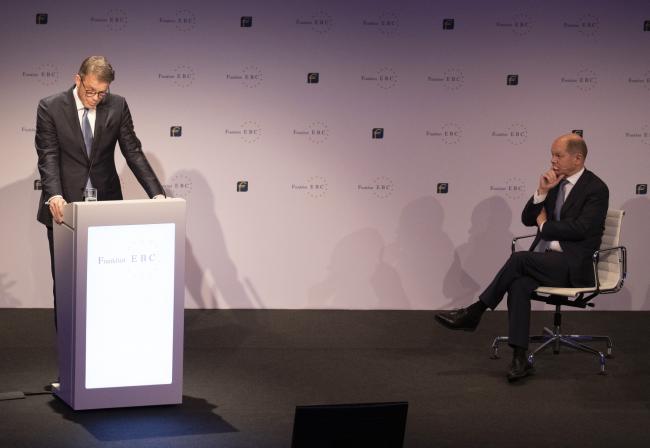(Bloomberg) -- A week after Christian Sewing took charge at Deutsche Bank AG (DE:DBKGn) in April, Chancellor Angela Merkel’s newly appointed finance minister, Olaf Scholz, buttonholed the chief executive officer of Germany’s largest lender at an event in Berlin.
The 15-minute exchange -- between canapes and ceremonial speeches in a Prussian palace at the German banking association’s annual reception -- marked the start of a rapprochement between Merkel’s government and the embattled financial giant. Since then, Sewing and other Deutsche Bank executives have had contact with Finance Ministry officials on average every two weeks, a noticeable change after years of chilly relations.
The thaw stems from growing concerns by Berlin’s power players that more than 30 billion euros ($34 billion) in bank bailouts in the financial crisis weren’t enough to ensure the lender can weather renewed strain if the economy cools down. Any trouble at the bank could spill over to the broader economy, given its links to German industry -- and stoke a political backlash.
The controversial fix increasingly being pushed by Scholz and Joerg Kukies, a former Goldman Sachs (NYSE:GS) banker who serves as his deputy, is to make Deutsche Bank even bigger by merging it with domestic rival Commerzbank AG (DE:CBKG). The goal would be to create a national champion to serve the backbone of Germany’s export economy, a bank that will lend to the nation’s companies through the storm of an economic crisis. It would also avoid a government red line: additional taxpayer funds to shore up the banking industry.
The German Finance Ministry and Deutsche Bank declined to comment.
Scholz, a Social Democrat, was the labor minister when the debt crisis hit and dealt with the real-world disruption that the financial convulsion caused. He then became mayor of Hamburg, where he had searched for investors for troubled local lender HSH Nordbank.
Since becoming finance minister and vice chancellor last March, Scholz -- who risks taking the blame if the Deutsche Bank plan fails -- has made clear that stabilizing Germany’s largest lender at home is only a first step.
Industry proponents of a merger point to massive cost savings a combined entity would be able to achieve, especially at Commerzbank. A merged bank would have a much larger market share in the fragmented German banking market, putting it in a better position to prop up its margins.
But not everybody is on the same page. The tie-up would be a massive undertaking that would worsen the too-big-to-fail problem Deutsche Bank already has -- and still be insufficient to solve the lender’s struggle to deliver healthy profits. With a combined balance sheet of 1.9 trillion euros, risks are rife, economically and politically.
“I am very critical of a national merger,” said Danyal Bayaz, a finance expert and member of parliament with the Greens -- the second-strongest party after Merkel’s bloc in recent polls. “This would reinforce the too-big-to-fail problem, which could eventually fall back on the German taxpayer.”
Fraught Relationship
Merkel has stayed on the sidelines, while taking a keen look at Sewing’s back-to-basics restructuring, a person familiar with her thinking said. Her relationship with the bank has been fraught, particularly since the chancellor was burned by a schnitzel-and-asparagus dinner she hosted for former Deutsche Bank CEO Josef Ackermann.
The April 2008 event took place as the global financial crisis was brewing and gave the impression of being too cozy with an institution since sullied by a steady stream of lawsuits and investigations. The company has been hit with $17 billion in fines over the past decade.
The reputational risk tied to the storied lender only compounds a raft of geopolitical headaches for the German chancellor, already harried by Donald Trump’s threats, a fragmenting European Union and an emerging challenge from China.
While she has defended using government funds as necessary to keep the euro area together 10 years ago, this time the battlefield isn’t Athens, Dublin or Madrid, but Frankfurt. The new engagement dovetails with an increasingly hands-on government approach to industrial policy introduced this week to reinforce Germany’s export champions in competition with the U.S. and China.
Hands-on Approach
Presenting the National Industry Strategy 2030, Economy Minister Peter Altmaier -- a close Merkel ally -- said Germany would become more active to “maintain and expand the enormous prosperity this country has had for the past 70 years.”
Altmaier on Tuesday underscored that the German economy as a whole benefits from having a lender with the reach of Deutsche Bank.
“A country like Germany should have a role on the global financial markets,” he said.
